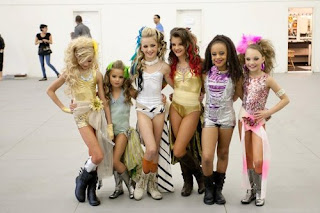One of Lifetime's most popular shows is the reality series, Dance Moms. In it, we follow the lives of seven young girls studying dance at a studio which specializes in training dancers for careers. Owner Abby Lee Miller is notorious for her tough love, no nonsense attitude when it comes to teaching, but is also just as well known in the competition circuit for her cutting edge, limit-pushing choreography, which almost always wins a first place prize. In a style unconventional of most studios, Abby places her dancers in direct competition with their teammates, either on the actual competition day, or just within her eyes. Using her pyramid style of ranking, Abby begins each week in the studio with a team meeting, and tells the girls just where they stand in her eyes.
Her reasoning behind this has always been explained as such: the girls are going to grow up and go out looking for jobs; jobs for which they will have to compete...likely against each other. It is a lesson they will eventually have to learn, so why not teach it to them now right? Maybe she's harsh in her critiques, and the girls might cry when she's particularly hard on them, but they all come back and work that much harder next time. (Maybe this is out of fear, but whatever the reason, Abby still gets results). Whenever she sees one of the girls crying, Abby lays her famous line on them, and tells them to "save their tears for the pillow!" meaning, get over it, cry at home, where no one can see you, because it is a waste of time to sit and cry at rehearsal rather than work. It sounds harsh, but is actually practical in its basis; we're just not supposed to agree with Abby, we're supposed to think she's unreasonably harsh and cruel to the children.
The "interesting" part of the story is that when she pits these girls against each other, it rarely forms any outright animosity among the girls, but the mothers end up in vicious arguments almost weekly, based upon who was placed at the top of the pyramid, who was chosen to have the special part in the group dance, who got solos, duos, trios, as if they were personally affronted, as if it were their own hard work not being noticed. The mothers are portrayed as living vicariously through their daughters, some seem to be living out their own unfulfilled dreams, others reliving their past, and others actually enjoying seeing their daughters perform and enjoy themselves on stage.
Whatever the reasoning behind their behavior, these mothers get viciously protective of their daughters, and any slightly tense situation spins wildly out of control into a cat fight at the slightest push. The show makes women look bad by perpetuating the stereotypical bitch that is the "bad" character, and the catty women, the well-educated one looking down on the others, the ditzy, looks-obsessed trophy wives, the one who's always fake, and always sucking up to the person in charge, and the bitter one who's stuck in the past. By either casting women who fit so easily into these roles, or by coaching them and semi-scripting them into these scenarios, the producers of the show set themselves up to be demoralizing and demeaning to women.
Another example of the ways in which the television show poorly displays girls and women is they way they allow the girls (all under age 15, by the way) to dress when they appear on the show. We rarely ever see the girls in a full shirt in rehearsals, and even on stage their costumes typically consist of tiny shorts, and a crop top to match, unless the dance is of a more classical style, in which case that style of dress would not only be age-inappropriate, but also inappropriate for the genre, which would lose them points. The girls are often dolled up in highly sexualized manners - a style they often times carry over into their publicity shots. Dressed and made up far more maturely than their real ages warrant, they pose provocatively for the camera, at ages 9, 10, 11, and 12.
While it is not clear that the show is directly responsible for the way the girls dress (they may not be telling them to do so) they are responsible for being the ones to broadcast these scantily clad girls on primetime television each week, regardless of the consequences to girls watching it, and these girls living out their lives on screen.
Below are just a few examples of the inappropriate dress and make up the girls are seen in every week:


.jpg)
.jpg)


.jpg)
No comments:
Post a Comment